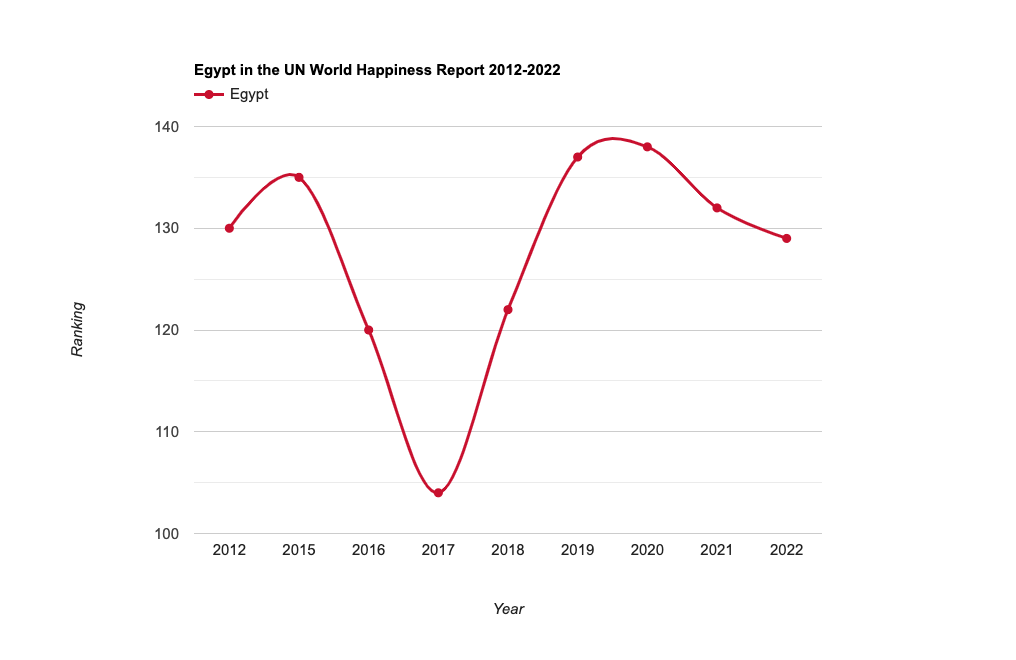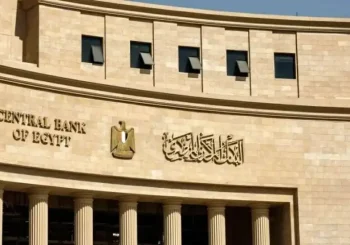In Egypt’s comedy classic, ‘Asal Eswed (Bittersweet, 2010), there is a scene in which Masry, the film’s protagonist and an Egyptian normally residing abroad, goes on to lambast Egyptians for seeming happy despite the struggles he constantly sees around him during the events of the film.
“Here in Egypt, we have the concept of alhamdulillah (thank God),” responds Masry’s neighbor, ‘Am (Uncle) Helal, summing up the common stereotype that Egyptians are a happy bunch no matter the difficulties they face.
Since 2012, The United Nations (UN) has been publishing the World Happiness Report annually. After passing a resolution in July 2011, the UN invited member states to measure the happiness of their citizens every year as a tool for better policy-making.
Egypt has consistently participated in this report, and with a decade worth of analysis, there is now ample data to see a downward trend in Egypt’s happiness.
How does the UN measure happiness?
Measuring happiness is a tricky task to tackle, but the UN Sustainable Development Solutions Network (UNSDSN) utilizes a measurement system known as the Cantril ladder, which is a single-question survey conducted by Gallup World, a world-renowned organization analytics firm.
In layman’s terms, Gallup asks a sample of 1,000 nationally representative respondents per country to envision a ladder in front of them with its steps numbered zero to ten. They are then asked to place their happiness on one of those numbered steps – with zero being the least happy life possible and ten being the happiest they could be.
The answers to that question effectively decides the ranking of each country in the report.
So, does the notion that Egyptians are resilient and happy no matter the quality of life ring true when placed underneath the scope of the reports? The graph below tells another story.

The report’s ranking system includes 155 countries, and number one is regarded as the happiest, whereas 155 is the least happy country. In other words, the lower the number, the greater a country’s happiness.
In the period between 2012 and 2015, Egypt ranked between 130th and 135th happiest on the list of countries, placing it in the undeniably low 83rd percentile. It experienced an increase in happiness from 2016 and 2017, soaring to 120th and 104th respectively.
The 2016 and 2017 reports show that, despite the devaluation of the Egyptian Pound in November of 2016 and the resultant rise in prices of essential goods, Egypt’s ranking leapt to 104. From 2019 to 2021 Egypt yo-yoed back down between 130 and 138, then fell to 129 in 2022.
Understanding what this means
There is no one-stop answer to what this trend in data means. It could stem from a variety of factors, such as the method of analysis by the reports, the external variables a citizen faces, and the general culture of a society.
In an interview with Africa Check, Charles Wheelan, a professor of public policy at Dartmouth College, identifies the lack of objectivity in the Cantrill ladder.
“The most significant limitation is that happiness is obviously difficult to quantify and measure. It can mean different things to different people, and across cultures, so one should not oversell the findings,” states Wheelan.
The UNSDSN itself observes, in its 2020 World Happiness Report, that “one might criticize our ranking for relying only on subjective indicators.”
While the UN World Happiness Report does cite six underlying factors for a country’s happiness – gross domestic product (GDP) per capita, social support, life expectancy, freedom to make life choices, generosity, and corruption levels – they serve more as an exposition to a country’s ranking rather than to directly affect it.
Furthermore, the variables for analyzing the happiness data appear to shift based on the themes of said year. However, akin to the six factors, they do not affect the ranking in any way.
In other words, what can be understood is that there is a lack of sufficient data or national studies to provide a neutral or objective ranking – an issue that the UNSDSN is well aware of.
“Measures of the quality of the social context, which have been shown in experiments and national surveys to have strong links to life evaluations and emotions, have not been sufficiently surveyed in the Gallup or other global polls, or otherwise measured in statistics available for all countries,” states the report in its method of analysis chapter.
What does this mean for Egypt?
In the case of Egypt, it is likely that external variables play a crucial part in affecting the happiness of its citizens. Over the past decade, the Egyptian people have faced a myriad of political, economic, and global challenges.
This is evident in the reports, showing said variables have negatively impacted its overall happiness ranking. More specifically, it highlighted Egypt’s political and economic instability as causes for unhappiness in 2016 and as well as 2020.
Nevertheless, the trend in unhappiness, while not complete in observation, could still offer an idea of the general direction Egyptians have taken in terms of their happiness.
Increasing trends in Egyptians migrating elsewhere may also hint at an underlying sense of unhappiness domestically. According to the Central Agency for Public Mobilization and Statistics (CAPMAS), the number of Egyptians abroad in 2017 was estimated to be 10.247 million.
While some have rediscovered themselves abroad, migrating is not the answer to happiness for everyone. Cultural barriers and the difficulty of adaptation could have a negative effect on a person’s levels of happiness.
If trends are to play a role in helping us identify happiness, then one can expect Egypt to fall further down in the ranking once more by the end of 2022 as the Egyptian Pound free falls in value and supply shortages create an inflation in prices.
The UNSDSN’s findings are valuable and may offer a glimpse into the sentiments of Egypt’s society over the past decade. Through their findings, it can be recognized that Egypt’s happiness is yet to break the top 100 even.
Yet for anyone who lives in Egypt, there is always a ‘Am Helal in the neighborhood, reminding us that despite troubling times, Egyptians are a resilient people, who prefer to not dwell too much on societal struggles.







Comments (0)